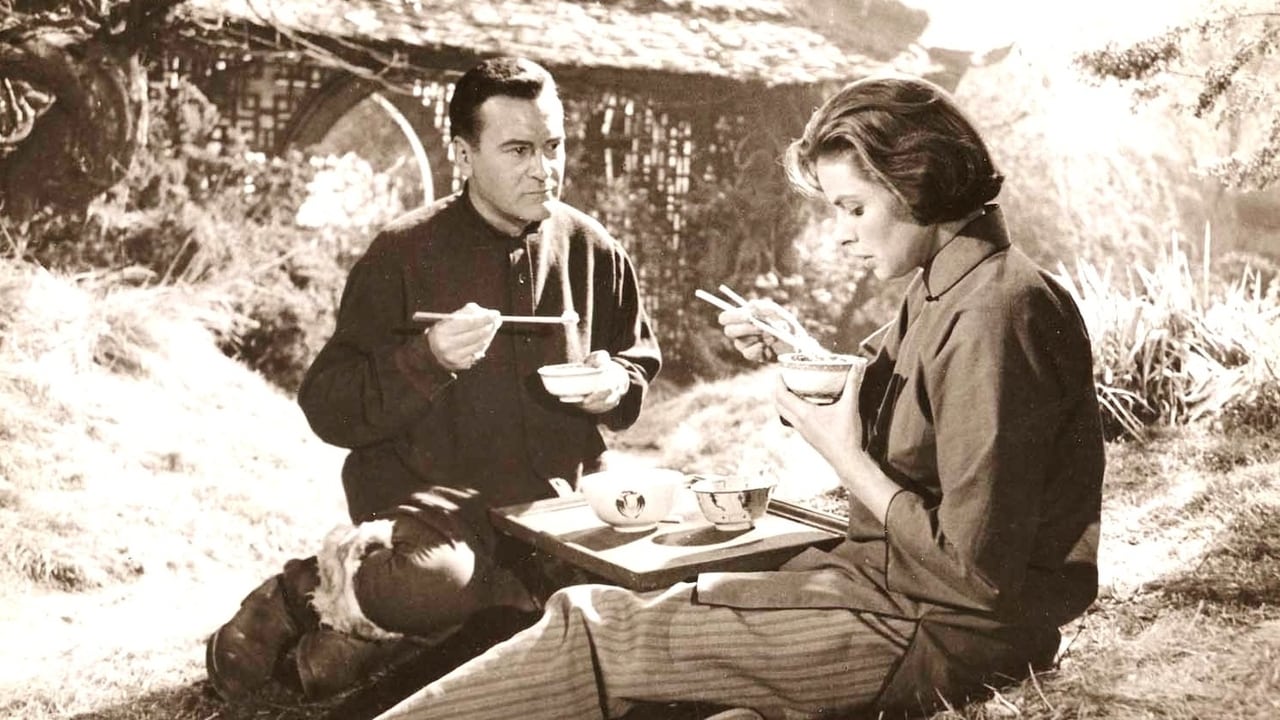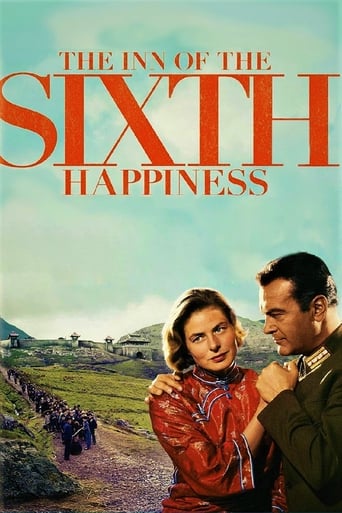

not as good as all the hype
... View MoreA movie that not only functions as a solid scarefest but a razor-sharp satire.
... View MoreIf you're interested in the topic at hand, you should just watch it and judge yourself because the reviews have gone very biased by people that didn't even watch it and just hate (or love) the creator. I liked it, it was well written, narrated, and directed and it was about a topic that interests me.
... View MoreThe thing I enjoyed most about the film is the fact that it doesn't shy away from being a super-sized-cliche;
... View More"The Inn of the Sixth Happiness" tells the true story of Gladys Aylward, an Englishwoman in the 1930s who was turned down when she applied to be a missionary in China and instead decided to pack up and head there on her own to see what contributions she could make. As with all movies based on true events, I have no idea how accurate this movie is, and I don't much care. I look to movies to tell me good storied well told, not dogged recreations of things as they actually happened, and I know how to take my films with a grain of salt, thank you very much. And this movie tells a good story, and tells it very well.Ingrid Bergman shines as Aylward in a much more physical role than any I'd seen her in previously. The film turns into a kind of Chinese version of the "The Sound of Music" in its later parts, as Aylward leads a large group of children from one village to another across a harsh and rugged landscape in order to find safety from political conflict. But unlike the famous musical, this movie shows what it would actually be like to trudge across frozen mountains, or at least it comes closer to recreating what it would be like than did Rodgers and Hammerstein. One can't help but feel like this is a very sanitized version of events, but come on, this was 1958, and in any case would anyone want to watch a movie about the acute suffering of a bunch of children?A love story gets old fast and feels obligatory, even if it actually happened. On the other hand, I thought I would find Robert Donat cringe worthy playing a Chinese elder in yellow face, but I thought his parts of the movie were rather delightful.For what it's worth, my mother turned my on to this movie because the real Gladys Aylward visited her high school back in the 1950s to speak about the experiences depicted in this film, and she claimed that the movie was fairly accurate.Mark Robson received a Best Director nomination for this movie, the only nomination it managed to collect. Grade: A-
... View MoreMaybe sentimental and with a Hollywood twist but just take in the actual story of a marvellous women and an amazing trek.Also in reply to one reviewer who got it sadly wrong about the song.The origins of this song are obscure. The earliest extant record is a version noted in Anne Gilchrist's Journal of the English Folk Dance and Song Society (1937), learnt from her Welsh nurse in the 1870s under the title "Jack Jintle" with the lyrics:[1]My name is Jack Jintle, the eldest but one,And I can play nick-nack upon my own thumb.With my nick-nack and click-clack and sing a fine song,And all the fine ladies come dancing along.My name is Jack Jintle, the eldest but two,And I can play nick-nack upon my own shoe.With my nick-nack and click-clack and sing a fine song,And all the fine ladies come dancing along.My name is Jack Jintle, the eldest but three,And I can play nick-nack upon my own knee.With my nick-nack and click-clack and sing a fine song,And all the fine ladies come dancing along.
... View MorePhew! – what would the world have done in the last few centuries without the missionary zeal of a handful of Caucasian heroes and heroines, who dragged the benighted places of the earth to their present enlightened heights, to the everlasting glory of God, themselves and, er Hollywood? OK OK, I'm being a bit unfair to a very enjoyable film – and the real life woman whose story inspired it – to suggest that "The Inn of the Sixth Happiness" is blighted by the tendency to glorify the (Caucasian) individual at the expense of the (native) group. If you can watch it in context it's great cinema. Radiant Ingrid Bergman plays, somewhat implausibly but nonetheless effectively, the former servant Gladys Aylward, another in the long history of famous English Eccentrics, whose missionary zeal takes her quixotically on a difficult journey to a remote northern province of China. There, in the period leading up to WWII and Japan's attack on China, she becomes an indispensable part of the community, in no small part due to her work as the local Mandarin's Foot Inspector, travelling the province to enforce the new law banning the binding of women's feet. Along the way her life is shaped by her evolving friendship with the Mandarin himself, and her initially difficult relationship with handsome, bitter Captain Lin Nan.That the Mandarin and Lin Nan are both played by Caucasian actors is not surprising for the 1950s, but is distracting and annoying. This casts no discredit on the actors themselves. Robert Donat's last film performance as the ageing, wily Mandarin, and Curt Jurgens' powerful study of a cold military man whose life is turned upside down, are both excellent, nuanced and committed. Bergman really throws herself into the part, and a large cast lend believability. Yang, the Chinese cook, adds comic humour with his entertainingly tall Bible tales; and there's a welcome appearance by the charismatic Burt Kwouk.So I gleefully overlook the outdated attitudes and conventions, and immerse myself in a different world with great pleasure – but I take even greater pleasure from knowing that in the modern age, each country gets to tell their own stories, without Caucasian interference. Now great directors such as Ang Lee, Zhang Yimou, Ki-duk Kim, Kitano Takeshi, Mohsen Makhmalbaf and Idrissa Ouedraogo show the western world how it's done.
... View MoreThis film concerns the life and achievements of one Gladys Aylward, a Christian woman from Great Britain who conceived early on that her place in the world was in China. She was a remarkable person who let absolutely nothing deter her in her calling. That included a lack of formal education, no support at all from any accredited missionary group and no money of her own. She worked as a maid to get the money to get a one way ticket to China with only an address of an aged female missionary who needed a young assistant.This film marked Ingrid Bergman's complete return to our fickle public's favor. After the scandal of her affair with Roberto Rosellini and her divorce, the public would not accept her in saintly roles like Joan of Arc and The Bells of St. Mary's. But winning her second Oscar two years earlier cemented her comeback from Europe and this part restored her in our fickle public's affections. We'd never get away with casting her as an Englishwoman today, but she overcomes any accent problems with unbridled talent.She soon inherits the whole mission when Athene Sayler dies. And she supports it by working as a foot inspector for the local mandarin. In those days of the twenties among other things the Kuomintang government was trying to do was undo the Chinese custom of footbinding females at a young age so they would have petite feet. It met with a lot of local resistance, but she proves up to the task.The title of the film comes from the idea that Athene Sayler had. Not to open up a formal church as such. Instead she wanted to open an inn in which travelers could stop and hear stories for entertainment. No television in those rooms. The stories they heard were those of the Bible. It was Sayler, Bergman, and their cook Peter Chong who ran the place and soon it was Bergman and Chong.If Bergman's casting seems bizarre by today's standards, the casting of Curt Jurgens as a Chinese Kuomintang Army Colonel is worse. Jurgens's occidental features are written into the script making him bi-racial, Dutch father and Chinese mother. He's a man with little convictions about spiritual matters, except he comes to believe in Bergman, in her innate decency, her dedication to his people, and what she's trying to accomplish. The mandarin is even more bizarrely cast. The part calls for an asthetic actor so they got the best around in Robert Donat. This was Mr. Donat's farewell performance, he died while the film was still in theaters. No one would get away with that casting today, but Robert Donat is also that good a player.I'm sure if the film were remade today, we'd have real oriental players like Russell Wong for the Colonel and James Shigeta for the mandarin and maybe someone like Kate Winslet for Gladys Aylward. But would it be as good as this film?The subject of missionaries and the good they do is one hotly debated topic. It does take a certain amount of brass to go to a given place and tell everyone your belief system is all wrong. I suppose the best way to lead is by example and Ingrid Bergman as Gladys Aylward set the best example she could. In fact she did one thing most missionaries, good or bad, wouldn't consider. She gave up her British citizenship and became a Chinese citizen.The film was helped a great deal by the inclusion of that children's song This Old Man where Ingrid tries to teach her youngest charges some English with it. It was enormously popular back in the day and Mitch Miller's record of it was heard constantly.The climax of the film and what gave Gladys Aylward her place in history is that trek with a hundred orphans away from the advancing Japanese army. A remarkable achievement indeed from a remarkable dedicated woman who wouldn't listen to anything, but what was inside her soul.
... View More